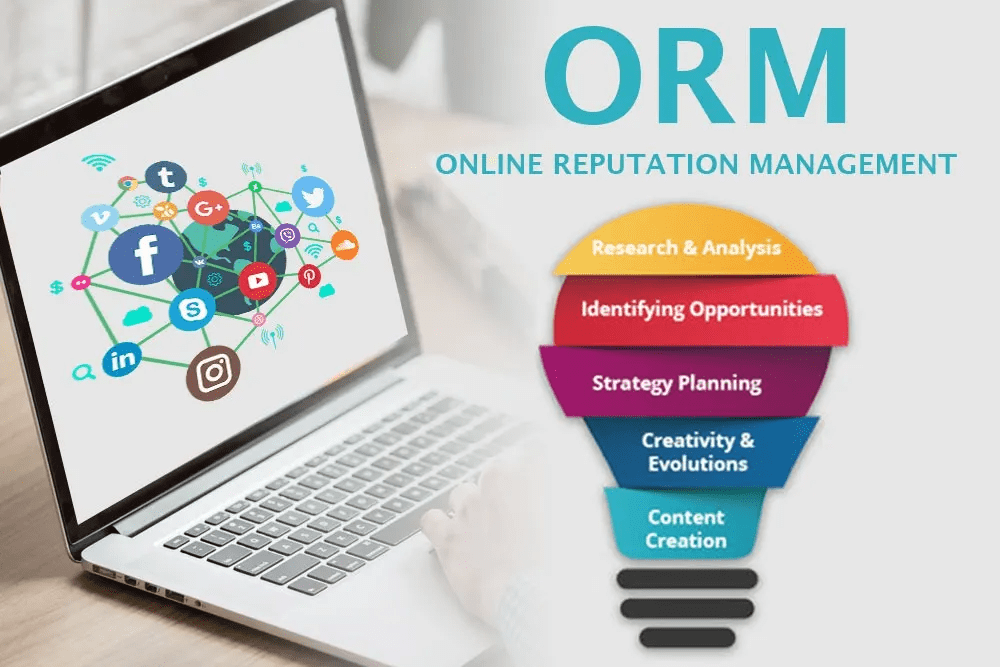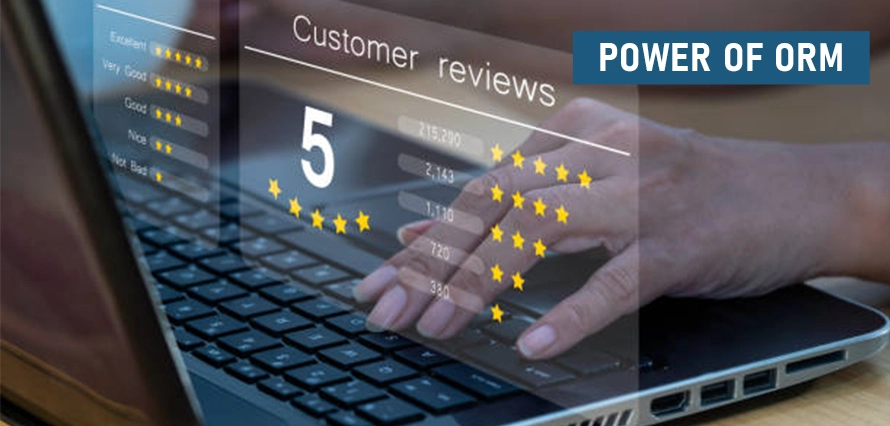Table of Contents
The world is becoming digital day by day, and we can access information about anything with just a click. The users of the internet hold the power of judgment. The collective impact of these judgments can either enhance or detract from a brand’s online reputation.
The businesses that appear at the top of the search engine page get more engagement than the lower-ranking businesses. These days, the internet serves as more than just a source of information. People trust the internet to deliver what it promises to be reliable. As a result, maintaining a professional online presence is essential for better interactions with users. This is the reason behind the significant importance of online reputation management (ORM).
What is Online Reputation Management?

Online reputation management is a practice that closely observes, influences, and enhances a person’s or business’s online reputation. ORM is sometimes referred to as internet reputation management or digital reputation management.
Why Is Online Reputation Management Important?

Online reputation is a crucial factor for a business to compete in this era of tough competition. Online reputation management creates a positive environment for your business on the online channels that increase your customer engagement, establish you as a trustworthy business and transform you as a brand.
According to a survey, more than 62% of United States consumers would hate buying something from an untrustworthy brand.
Here are some real-world examples demonstrating the power of ORM:
1) Domino's Pizza Incident Involving Food Handling
A 2009 video showing Domimo’s employee handling food improperly went viral. It damaged the business’s internet reputation, and Dominion predicted that it would have unfavourable long-term effects. They react right away, using ORM techniques. They redesigned their social media presence to better interact with customers, made a public apology, and let go of the guilty staff members. By taking a proactive stance, Domino’s was able to rebuild its reputation, which enhanced sales and customer confidence.
2) United Airlines Incident of Misbehaving With The Passenger
An event involving the forcible removal of a passenger from an overbooked flight occurred at United Airlines in 2017. When the incident’s footage went viral, United Airlines’ reputation was seriously hit. They were initially careless, but after receiving strong criticism from the public, they started using ORM approaches. They released an app, implemented new rules to stop these things, and concentrated on enhancing customer support. Finally, after much effort, they salvaged their online reputation.
3) Samsung Galaxy Note 7 Fire Catching Issue
In 2006, a report about the Samsung Galaxy Note 7 caught fire. Numerous occurrences involving batteries catching fire were reported. Samsung recognized the gravity of the situation and took action to protect its online reputation. With ORM tactics, they had done everything—from providing replacements and refunds to conducting in-depth investigations and doing everything—and repairing their reputation.
How Is Online Reputation Management Different From SEO?

Online reputation management is an especially designed tool to keep an eye on a brand’s image, track the issue and restore the brand’s image. On the other hand, SEO or search engine optimization is a set of techniques for improving the visibility of the website on search engines and attracting more traffic to the website. The difference between SEO and ORM.
- SEO is specially designed to increase visibility on Google, Bing and other search engines.
- SEO creates tactics to increase top-ranking.
- SEO targets to dominate the SERPs for many focused keywords or search terms.
- The goal of ORM is to overflow the website with uplifting material to win the user’s trust.
- ORM works in collaboration with SEO to monitor misleading content and websites in search results.
- ORM aims to dominate search results for particular relevant keywords or search phrases.
Factors Affecting a Brand's Online Reputation
There are several factors that directly impact the online reputation of a brand. These factors are:

1) Customer Reviews
Reviews on online platforms play a very significant role in the online reputation of a brand or company. It directly influences purchase decisions and the brand’s credibility. Reviews are a positive signal that directly boosts your SEO and brand image and acts as strong social proof for prospective customers.
2) Website Availability
A brand’s website and online presence are the real assets in the digital world. Regular interruptions on a website directly impact the brand’s credibility and customer acquisition rate. If the website shows regular issues, it is a nightmare for a brand’s image. It can have long-term effects on revenue generation and potential customer losses.
3) Connection With Influencers
According to research, more than 38% of those surveyed say they have purchased an item online after witnessing an influencer use it. The influencer’s actions and reputation are directly linked to the brand’s reputation. If an influencer is involved in a controversy, it may unintentionally damage the brand it is associated with.
4) Internal Culture
News or tales regarding a company’s internal culture can harm the company’s reputation, especially if they entail harassment, discrimination, or any other kind of injustice. People are sensitive to injustice and harassment, so it is essential to maintain a fair work culture.
5) Employee Testimonials
Recent research indicates that 82% of job seekers think a company needs to have a positive reputation as an employer. Bad employee reviews could damage a company’s reputation by giving the impression that its employees are undervalued. So, employee testimonials are considered a crucial component of online reputation management.
Strategies for Better Online Reputation Management
You can use a variety of tactics to manage your reputation more effectively. Here, we outlined what was most crucial to them.

1) Trend Analysis Insights
Analyze the trends of the recently mentioned products in relation to the specifics, which helps you understand which aspects of your product or service were popular then. You can focus more on this and attract more customers by implementing marketing efforts around this feature.
2) Product Development and Services
Customer feedback provides valuable insights that help the development and improvement of products and services. By preferring client choices, you may effectively encourage innovation and adapt your offerings to meet changing market demands.
3) Sentiment Analysis Insights
Customers’ sentiments are directly in motion with online reputation management, whether they are negative, positive or neutral. Closely monitor the customer’s feedback and their perceptions. These sentiments are the key factors in building a strong reputation on the internet.
4) Competitive Analysis and Evaluation
Analyzing competitor customer engagement numbers can give you important information about how well your brand is performing. You may improve brand engagement and maintain your competitiveness in the market by using effective competition strategies.
5) Influencer Impact Insights
In this world full of social media influencers, you have to select a good influencer, and during the campaign, you have to evaluate the marketing efforts of the influencer. A good influencer collaboration can immensely enhance the brand’s reach and visibility rather than anything else.
6) Review Generation Strategy Adoption
Reviews are like the stairs that help you directly reach the top. Encourage customers to share their experience and positive feedback about your product and services. Send an SMS/ or email to your previous customers to leave a review on various platforms like Google, Facebook, instagram and so on.
7) Content Optimization
Content holds a weight in influencing your online reputation. Optimizing content generation according to popular subjects and customer preferences enhances engagement. You may produce content that connects with your target audience and encourages more engagement.
8) Plan a Crisis Management Strategy
As we mentioned earlier, a single event can ruin your online reputation. You have to prepare a strategy in advance. Use media monitoring tools, keep an eye on industry changes, and know your audience’s or customers’ preferred channels. It is a famous quote: “If you want peace, prepare for war.”
Conclusion
Online reputation management is essential in this digital age. Suppose a company wants to expand quickly because of how the public perceives brands; a brand’s reputation can be greatly impacted by every interaction, review, and piece of material on the internet. Businesses may create and preserve a positive online reputation by putting ORM methods into practice and converting possible setbacks into chances for expansion and the development of trust. Adopting ORM in conjunction with SEO services guarantees a thorough strategy for online presence, which in turn develops a trustworthy and reputable business identification in a cutthroat industry.







